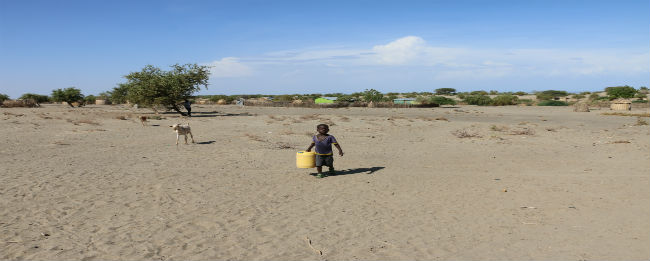Teresa is from Lowareng’ak, an area in Turkana, northern Kenya. It hasn’t rained there for over a year.
Fortunately, a new borehole, installed by Oxfam, means Teresa has access to a sustainable source of water. Not everyone is so lucky. “It is hard for those who don’t have these (boreholes),” Teresa says. “Some walk for hours to come find water here. One woman told me that if she had known sooner that we had water here, her animals would still be alive today.”
More than 15.8 million people are affected by the drought in East Africa, and at least 13 million are severely food insecure. The drought has caused crops to fail and cattle to die, while the lack of clean water is increasing the threat of cholera and other diseases.
Scotland is over 10,000 kilometres from Turkana. Yet decisions made here – and in other developed countries – can be felt by Teresa and her neighbours.
Take the forthcoming Good Food Nation Bill at the Scottish Parliament. At a time of scandalous food insecurity in Scotland, the Bill will, rightly, focus on domestic policy and practice. Unlike in East Africa, there is no shortage of food in Scotland – here, our supermarket shelves are full, but not everyone can afford to buy the food they need.
But millions of people around the world, like Teresa, have a stake in this Bill too. If Scotland is truly to become a ‘Good Food Nation’ we must end food insecurity in Scotland while ensuring the actions we take here don’t inadvertently result in more people facing hunger in other parts of the world.
Achieving this twin objective is critical to delivering upon our commitments to the Sustainable Development Goals – including ending hunger. While the Goals are global, realising them by 2030 requires both change at national level and an acceptance that the impact – good or bad – will be felt far beyond national borders.
In Scotland, this means government departments – whether they lead on food, social justice, the environment or international development – must act together rather than in isolation. After all, food and the natural environment are inextricably linked. It’s therefore imperative officials and Ministers recognise the deep linkages between the Good Food Nation Bill and Scotland’s upcoming new Climate Change Act.
No one knows the importance of this connection more than people living in Turkana. Four failed rain seasons in a row, higher temperatures and drier conditions have meant that there has not been a successful planting or harvest season since 2015. Hunger is the inevitable consequence.
Margaret lives around a hundred kilometres away from Teresa, in Kapua village. She must walk four kilometres from her home to a well just to fill her 20-litre bucket with water. “I have to make several trips to have enough water for my children,” Margaret says. “Some days I’m too weak to go so we either borrow from our neighbours, or wait until I’m strong enough.”
The drought across East Africa is a slow, creeping disaster. But it shouldn’t surprise us. Climate scientists and activists have warned for years that climate change would cause or intensify crises like this one. For the people impacted, climate change is not a distant, future threat. It is changing their lives now.
Catastrophic loss of life today is not inevitable: urgent and robust humanitarian and political action now will prevent the worst from happening. But beyond this crisis, we must do more to reduce new emissions while building people’s resilience to the climate extremes that can no longer be avoided.
The Scottish Government must therefore use the impetus of becoming a ‘Good Food Nation’ to re-energise its resolve to be a world leader on climate change. That means being ambitious when setting their new emission reduction targets by delivering on Stop Climate Chaos Scotland’s call for a target of net zero emissions by 2050 at the latest. Other governments – like Sweden, New Zealand, France and Iceland – have already committed to achieving zero emissions by 2040 or 2050; Scotland’s ambition cannot fall behind.
There can be no stronger driver for change than the level of suffering in East Africa. And there could be no greater way to demonstrate Scotland’s ability to deliver a coherent, cross-government approach than by ensuring the Good Food Nation and Climate Change Bills work together to protect people from hunger; wherever they live.
This article originally appeared in The Geographer magazine.
